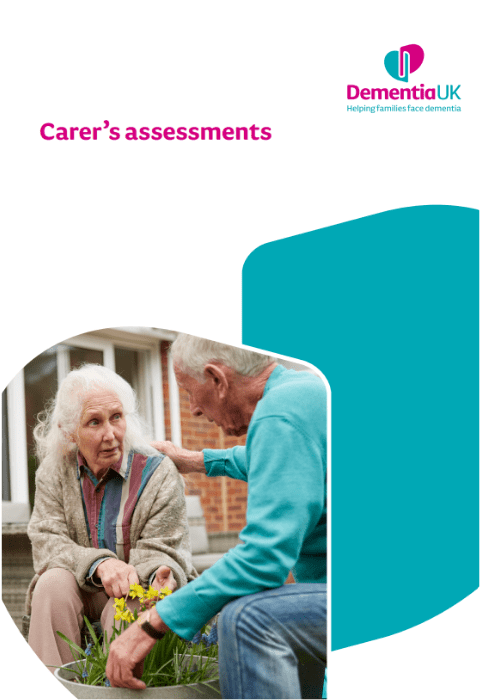
Nat’s story – “Being a young carer can be lonely”
Nat reflects on her experience of being a young carer and the support she received from the Nationwide dementia clinic.
If you are caring for someone with dementia, it’s your legal right to have a carer’s assessment. Our dementia specialist Admiral Nurses explain how to arrange it and how it could help you find support as a carer.
We are aware that in some areas, there are waiting lists for an assessment. While there isn’t a direct substitute for having a carer’s assessment, our Admiral Nurses can help identify your most pressing needs and suggest a plan while you are waiting.
A carer’s assessment is an evaluation of your needs to determine how your caring role affects your life and what support you may need to make it easier. Your local council/local authority is responsible for carrying it out.
Even if you feel you are coping well, it’s still worth requesting a carer’s assessment. It means support can be put in place to help you keep caring for the person with dementia for as long as you want to.
There is another type of assessment called a needs assessment, which examines what support the person with dementia requires, rather than what you need as a carer.
These are sometimes done at the same time, but if possible, it’s best to arrange them separately so you can focus on your individual needs at the carer’s assessment.
Often, people who look after a family member or friend with dementia don’t consider themselves to be a carer, but you are a carer if you help the person with:
There is a range of support available for carers, including financial assistance, support groups and resources to help you connect with others who understand their challenges. The carer’s assessment can help you identify what you might be able to access.
Carer’s Allowance is a benefit designed to support carers, currently £83.30 per week (this is reviewed annually in April). You must be caring for someone for at least 35 hours a week, and they must be receiving certain benefits such as Attendance Allowance or Personal Independence Payment (PIP). There is an earnings threshold. For more information visit the Government’s Carer’s Allowance page.
In Scotland, the equivalent benefit is called Carer Support Payment.
If your carer’s assessment identifies that you need a break from caring, your local authority may recommend respite care for the person with dementia. This might involve having a paid carer or volunteer to sit with the person for a few hours, a regular place in a day care centre, or a short stay in a care home.
A carer’s assessment may suggest that you receive some training to improve your coping skills and teach you how to best support the person with dementia. This might include education on:
Training may be offered as a structured programme or one-to-one guidance.
There are many support groups that you may be able to access as a carer, regardless of whether you have a carer’s assessment. These can be a great source of advice and support from other people who care for someone with dementia or another condition. Support groups may be local and in person, or online. The Carers Network can help you find networks within your area.
The carer’s assessment might recommend that you have some help at home. This could be, for example, a paid carer to support the person with dementia and give you a break, or help with housework or gardening.
The carer’s assessment might recommend that you receive financial help with transport costs, such as taxi fares, if you don’t drive.
Many carers find their mental and physical health suffers because of their caring responsibilities. The carer’s assessment might recommend strategies to support your wellbeing, such as gym membership or exercise classes.
Anyone over 18 who is providing care for another adult is entitled to a carer’s assessment. It doesn’t matter how many hours a week you spend caring, or how much you earn.
The person with caring responsibilities must consent to a carer’s assessment. If you are requesting it on behalf of a family member or friend, ensure you have their permission.
In England, you need to request a carer’s assessment from your local authority.
If you are caring with someone with dementia, you’ll need to contact Adult Social Services within your local authority to ask for a carer’s assessment. You can search for your local authority on the NHS website.
Your GP or another medical professional, such as a nurse, can refer you for a carer’s assessment if they think it would be helpful, and you agree.
The Care Act 2014 sets out how adult social care should be provided and outlines the following:
It takes into account the impact on carers, such as emotional strain or having multiple caring roles, and also emphasises the importance of a ‘whole family approach’ which considers the impact of caring responsibilities on children and other family members.
Carer’s assessments should follow the principles of the Care Act 2014.
There are some differences between carer’s assessments in Scotland, Northern Ireland and Wales. You can find out more about these changes by visiting Carers UK.
In all of the devolved nations, you will need to request a carer’s assessment from your local authority/trust. You can find its details by clicking the links below:
A social worker will contact you to arrange a time for the assessment. It usually takes place at home but may be done by phone or video call. It generally takes around an hour.
You will be sent a form to complete in advance of the assessment, or with the help of the social worker at the appointment. It is a good idea to review the form in advance to understand what will be asked, even if you don’t complete it until the day of the assessment.
You will need to provide:
Before the assessment, take some time to think through everything you do as a carer and make notes to remind you on the day.
The social worker should ask you:
Give as much detail as you can about how caring is impacting your life. The more specific you can be, the more accurate the assessment will be in identifying your needs and what support you require.
The social worker might also look around the home to see if you would benefit from any adaptations or living aids to help in your caring role, such as equipment to help the person to use the shower or toilet or get into and out of bed.
It can be helpful to have someone with you during the assessment, as they can share their insights into what your caring role involves and how it affects you. This could be the person you care for, a friend or relative. An advocate may also be able to help you and speak up on your behalf.
If your need for help becomes more urgent while you are waiting for your assessment, you can:
After the assessment, the social worker will prepare a care and support plan (which you might hear described as a carer’s support plan) with suggestions to help you with some of the challenges you might be facing.
This could include:
The care and support plan is designed to improve your quality of life. You should be asked for your thoughts, so make sure you share any views about what would or wouldn’t be helpful with the social worker.
Bear in mind that any changes may have to be introduced slowly and carefully to allow the person with dementia to feel comfortable, especially if you are introducing a new carer.
Your local authority may be able to offer financial help to implement the support you need. It will arrange a financial assessment (means-test) after the carer’s assessment to see what – if anything – you are eligible for.
Sometimes, the carer’s assessment concludes that the person doesn’t need any support. If this is the case, and you disagree, there are some things you can do.
If you disagree with the decision made about your care and support needs following your carer’s assessment, or with how the assessment was carried out, you can challenge this.
Initially, you can complain directly to your local authority. It should have a formal complaints procedure on its website, or you can phone and ask to be directed to the correct team.
If you are unhappy about how the local authority handles your complaint, or the outcome, you can escalate it to the Local Government and Social Care Ombudsman. An ombudsman is an independent person or agency that investigates complaints about organisations.
Local authorities must review a person’s care and support plan regularly to ensure it continues to meet their needs. You should be fully involved in any review or reassessment.
There is no fixed timescale for reviewing care and support plans, but reviews will typically be done after three months, and then annually. You can request a review at any point if you are unhappy with the support you are receiving.
A reassessment should also be done if:
Young carers under the age of 18 are entitled to a young carer’s assessment if they or their parent/guardian requests it. As with the adult carer’s assessment, this should be requested from the local authority.
The young carer’s assessment will consider whether it is appropriate for the young person to be caring, and their feelings about their role. The assessor will look at what the young person’s caring responsibilities involve, the impact on their life (including their education and leisure activities) and what help they and their family need – including planning for emergencies and for their future.
The assessment should involve the young person, their parents and anyone else they/their parents would like to contribute.
After the assessment is completed, the local authority must provide a written record of the meeting and any support for which the young person is eligible.
The Carers Trust can help you understand what a young carer might be eligible for and how to access help.
To speak to a dementia specialist Admiral Nurse about the carer’s assessment, looking after yourself as a carer or any other aspect of dementia, you can contact our free Dementia Helpline on 0800 888 6678 (Monday-Friday 9am-9pm, Saturday and Sunday 9am-5pm, every day except 25th December), email helpline@dementiauk.org, or book a phone or video appointment in our virtual clinics.
If you’re over 18 and look after someone without being paid, you can get a free carer’s assessment from Social Services. This helps you talk about your needs and the support that could make caring easier, like breaks, home care, training, equipment, flexible working, or mental health support. Find out more in this leaflet.


Nat reflects on her experience of being a young carer and the support she received from the Nationwide dementia clinic.

Tim reflects on the stigma that is often attached to dementia and the importance of the Black, African and Caribbean Admiral Nurse clinics.

Katrina reflects on the support she has received from her Admiral Nurse, Rachel, since her husband was diagnosed with young onset dementia.
No. The needs assessment looks at the needs of the person who requires care, whereas the carer’s assessment considers the support that the carer needs to manage their caring responsibilities.
While the person who needs care doesn’t have to consent to the assessment, if the care and support plan involves direct care for them, they will need to agree to anything that is put in place (if they have the mental capacity to do so).
Yes, you can refuse any or all of the recommendations in your care and support plan. You should be fully involved in developing the plan to make sure it meets your needs.
If you refuse support, the local authority may still offer advice, information or other services, and reassessment can be requested if circumstances change.
You are entitled to a carer’s assessment whether or not you work. However, any financial help that you might receive to fulfil your care and support plan might depend on your income. You are likely to need a financial assessment (means-test) to establish whether you qualify for local authority contributions.
Carer’s Allowance does depend on how many hours you work and how much you earn; however, this is separate from the carer’s assessment.